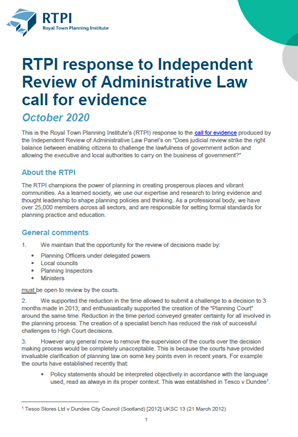RTPI response to Independent Review of Administrative Law call for evidence
October 2020
This is the Royal Town Planning Institute’s (RTPI) response to the call for evidence produced by the Independent Review of Administrative Law Panel’s on “Does judicial review strike the right balance between enabling citizens to challenge the lawfulness of government action and allowing the executive and local authorities to carry on the business of government?”
About the RTPI
The RTPI champions the power of planning in creating prosperous places and vibrant communities. As a learned society, we use our expertise and research to bring evidence and thought leadership to shape planning policies and thinking. As a professional body, we have over 25,000 members across all sectors, and are responsible for setting formal standards for planning practice and education.
Read the RTPI's response below or download it in PDF here.
General comments
- We maintain that the opportunity for the review of decisions made by:
- Planning Officers under delegated powers
- Local councils
- Planning Inspectors
- Ministers
must be open to review by the courts.
- We supported the reduction in the time allowed to submit a challenge to a decision to 3 months made in 2013; and enthusiastically supported the creation of the “Planning Court” around the same time. Reduction in the time period conveyed greater certainty for all involved in the planning process. The creation of a specialist bench has reduced the risk of successful challenges to High Court decisions.
- However any general move to remove the supervision of the courts over the decision making process would be completely unacceptable. This is because the courts have provided invaluable clarification of planning law on some key points even in recent years. For example the courts have established recently that:
- Policy statements should be interpreted objectively in accordance with the language used, read as always in its proper context. This was established in Tesco v Dundee[1]. Given the amount riding on the meaning of a phrase like “openness” of a Green Belt, this is an important principle.
- The courts have established[2] that a fair planning appeal procedure must involve being told the other side’s case and having a fair chance of replying to it. In addition, important issues raised by third parties must be taken into account.
- The courts have acted as a watchdog over the years regarding the question of whether the process of granting of planning permissions might be open to abuse - in short whether planning permissions could be “bought or sold”. A recent Supreme Court decision[3] shed further light on this in relation to the extent to which a community benefit offered with permission could be regarded as legitimate.
- The Supreme Court has also made clear [4] that planning decisions have to be supported by proper reasons.
- Finally, the courts have held[5] that each planning case is to be decided on its own merits, but subject to that, generally, planning decision makers should adopt a consistent approach or give reasons for departing from a previous decision.
(We are indebted to Zack Simons of Landmark Chambers for these examples)
- All in all the courts’ role has been invaluable in dealing with the fact that it is very difficult to write policies nationally and locally that are absolutely water tight, and in a rules-based democracy we need a process whereby uncertainty can be clarified.
- In addition, the UK Government is proposing the largest changes to the planning system in England in 70 years. A Planning Bill is expected in 2021. The proposals, if implemented, would involve a large change in the way that the planning system operates. A point of major change is that public engagement will take place in the writing of plans, not in the involvement of individual planning applications. The extent of this change – its merits are not at issue here – is so far reaching that new ways of working will need to be developed over time. It is unlikely (from previous experience) that in making such a major change, even with careful scrutiny from Parliament during the passage of the Bill, every detail can possibly be got right. The courts will play a valuable role in clarifying how the new system will work.
- The court also plays a critical role in the planning system in the context of statutory challenges, e.g. challenges to the appeal decisions of planning inspectors or the Secretary of State under Section 288 of the Town and Country Planning Act 1990. Albeit not technically judicial review, those cases regularly engage the same principles, and fulfil the same important functions such as those we have outlined above. So our comments in relation to the importance of maintaining the integrity of the judicial review process should also be taken as applying to statutory planning challenges”.
- The RTPI urges the Review Commission to consider these points when coming to its conclusions.
[1] Tesco Stores Ltd v Dundee City Council (Scotland) [2012] UKSC 13 (21 March 2012)
[2] Secretary of State for Communities and Local Government v Hopkins Developments Ltd [2014] EWCA Civ 470 (15 April 2014)
[3] Wright, R (on the application of Wright) v Resilient Energy Severndale Ltd & Anor - [2017] UKSC 37 (20 November 2019)
[4] Dover District Council v CPRE Kent [2017] UKSC 79 (6 December 2017)
[5] DLA Delivery Ltd v Baroness Cumberlege of Newick & Anor (Rev 1) [2018] EWCA Civ 1305 (08 June 2018)



